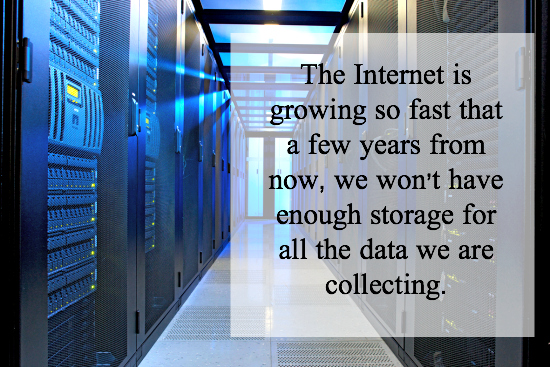In previous commentaries, I have talked about big data. Recently I read a column that predicted that big data might soon have a big problem. That problem will be storage space. The Internet is growing so fast that a few years from now, we won’t have enough storage for all the data we are collecting.
Gary Gentry at the digital storage manufacturer Seagate estimates that the world is going to need about sex zettabytes of storage capacity by 2020. At current rates of research and manufacturing, we might only have half of that capacity.
In case you are wondering, a zettabyte is a thousand exabytes. An exabyte is a thousand petabytes. A petabyte is a thousand terabytes. And a terabyte is a thousand gigbytes. To put it another way, six zettabytes is enough to hold over 200 million years of HD video.
Now, you may ask, why do we need so much storage capacity? The simple answer is that we store everything. The cyber world is awash in data. Every imaginable piece of data is collected and stored. And as I have discussed in previous commentaries, that is not necessarily a good thing.
By the way, it isn’t just the government and business that are collecting and storing data. The Organization for Economic Cooperation and Development found that a typical household with teenagers might own 10 Internet-connected devices. We are storing pictures, videos, and all sorts of data every hour of every day. That organization also predicts that the number of Internet-connected devices will increase to 50 in less than ten years.
Let me venture a prediction. If it becomes clear that we have too much data and not enough storage space, then there will be pressure to start deleting data. At first, that might be easy. Get rid of old data no one needs. But that won’t be enough, and then we will likely have contentious debates about what data to store and what data to delete. Should we purge unneeded Facebook posts? What about old YouTube videos? It should be an interesting discussion.
 Listen Online
Listen Online Watch Online
Watch Online Find a Station in Your Area
Find a Station in Your Area










 Listen Now
Listen Now Watch Online
Watch Online
